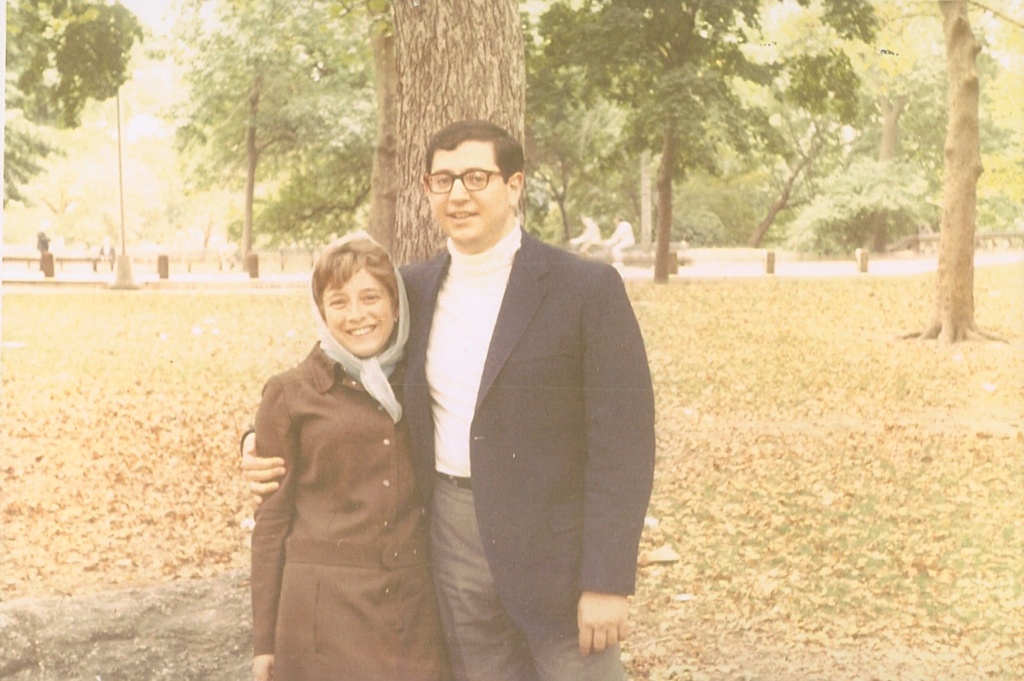Keith Sachs

Despite the fact that my birth certificate gives May 30, 1943 as my date of birth, the date my life began was June 23, 1968. On that Sunday afternoon, I was given a gift. I met Renée and was given the gift of “loving Renée.” I was walking through Central Park on that Sunday afternoon and saw the most beautiful woman I had or ever would see. She was, like a nymph, gliding across the grass, her shoes slung over her shoulder. I saw her and said to myself, I have to meet her. Maybe it was chance, maybe Kismet!
I introduced myself. Our initial conversation took place on a New York City park bench. It evolved into dinner and then daily phone calls, coffee and more dinner dates. Seven days after we first met, I knew that I would never love another woman for the rest of my life. But as our love grew, I grew to understand that the gift of loving her came with an important responsibility. My commitment to protect her against the fears of a childhood that Holocaust survivors understood, but few others did. I must love her, protect her and comfort her when the memories reappeared.
But where does a Donor Advised Fund fit into this story?
If I wanted her story to be taught to future generations, I needed a tool to do just that. And it was that understanding that helped me recognize the value of a Donor Advised Fund. The Renée Lise Sachs Charitable Fund for the Benefit of Humanity was created to honor my wife and perpetuate her unselfish work to teach the world that there are better ways to resolve our differences than war. Simply said, she wanted a better world for all mankind. It was her raison d’étre.
As a survivor, Renée had struggled with questions that many survivors ask. Why did I survive while so many other children died? If there is a purpose to my survival, what is it? She would say, “It is difficult to explain to others what you experienced as a child caught in a war. They can listen to your words, but can they ever really feel what you felt?” She tried to explain as though they were feelings in today’s world.
Renée was born on March 13, 1940. Sixty days later Germany declared war on France. One month later, France surrendered. Renée was three months old when France surrendered. That is how her life began.
Her family avoided arrest and deportation until 1943, when her mother was arrested. “The world was spinning around me and I had only my parents to keep me safe.” And they did until the age of four, when she was sent into hiding. The war ended when Renée was six, but she lived most of the next ten years in a Jewish children’s home. Her mother died in 1951. No one told her, but she knew. The letters a friend had written for her just stopped coming.
In 1955, her father sent Renée alone to the United States. That was the 3rd and final abandonment she would suffer at the hands of her father. By the age of 15, she had spent more than half of her life as a Hidden Child in Vichy France in a home for Jewish children who had no family to care for them.
“I had a terrible childhood, and it was not much better for many years after the war. And I survived.
I survived despite the abandonments, fears and disappointments. And so can every one of you. Yes, you have problems, and your problems are real, but you can survive.” She told her story of constant fear, but left her audiences with hope and, as a teacher, with an assignment.
“I pray that you all will live good moral lives. That you will speak for others who do not have the freedom to speak for themselves. You must learn from tragedy. You can find strength and courage even when you are afraid for your life. Yes, bad things do happen to good people.” Renée impressed upon her students that they, as future leaders, would have the opportunity to change the way we resolve disputes, and in doing so, to protect millions of innocent people from further suffering.
Renée was asked to speak on many occasions to both students and adults. One year, she volunteered to be the subject in the NJ Adopt a Survivor Program. Three AP history students spent the year talking with her and recording the sessions. The result was her video memoir, Portrait of a Hidden Child and a Lost Childhood. It is now part of the permanent collection at the US Holocaust Museum (USHMM) in Washington, DC.
The staff at the USHMM worked closely with me. We talked a lot and I listened a lot. In the museum’s letter of acceptance, Judith Cohen said, “Now, Keith, Renée’s message will live on in perpetuity.” I never have forgotten her words. They have become a cornerstone of my plan, to have those words live on in perpetuity.
In opening a Donor Advised Fund, I committed myself to perpetuating the vital lessons learned from Renée. Through the Fund, I provide ongoing financial support to existing and new organizations while building a cadre of non-museum speakers. I’m grateful to the Jewish Community Foundation for helping me honor Renée now, and to future generations. Long after I have made my last presentation.
